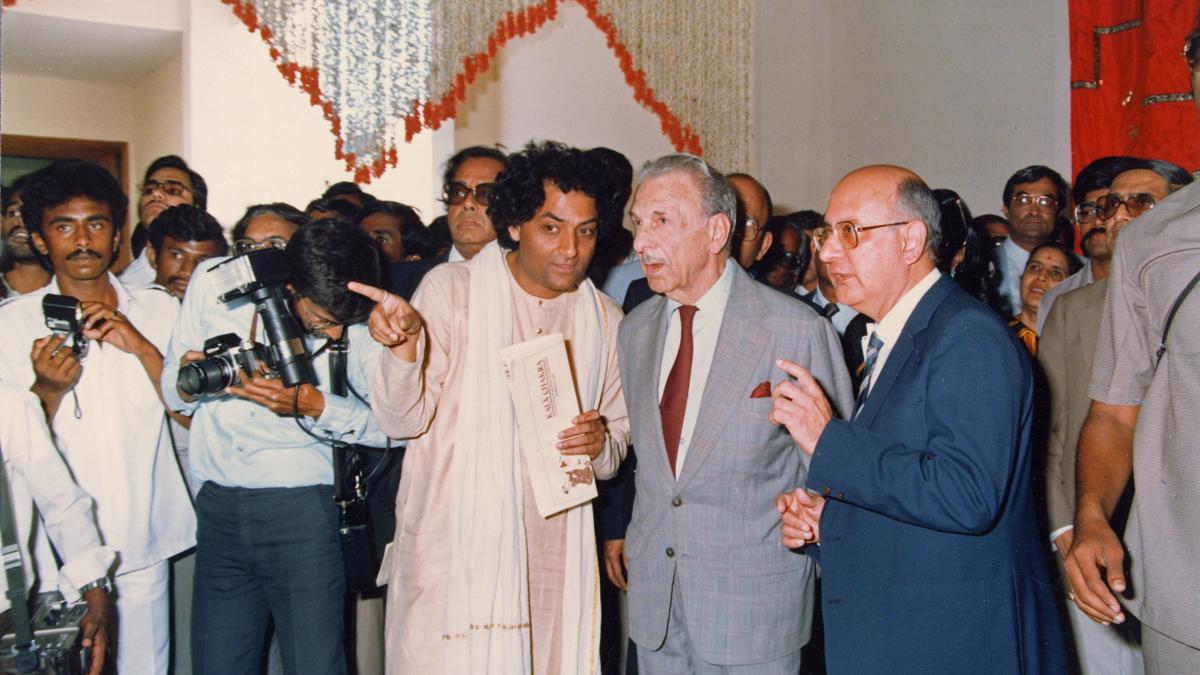Keeping with the times: Titan’s roaring success as a public-private partnership

J.R.D. Tata at the opening of the Hosur factory on March 11, 1988. Titan was one of the earliest corporate houses to have in-house training centre on quartz technology to train 3,000 persons.
| Photo Credit: Special Arrangement
At a time when public-private partnerships have rarely been successful, Titan Company Limited, a joint venture between the Tamil Nadu government and the Tata Group forged during the pre-liberalisation era, has been going strong for nearly four decades, offering valuable lessons.
Titan came into existence through a joint venture between the Tamil Nadu Industrial Development Corporation (TIDCO) and the Tata Group in 1984. J.R.D. Tata inaugurated the company’s Hosur factory in March 1988. From making watches, Titan has also emerged as a lifestyle brand across product categories, including jewellery and eyewear.
A jewel in the crown
According to details available on stock exchanges, TIDCO owns 27.88% in Titan, while the Tata Group owns 25.02%. Senior journalist Vinay Kamath in his book, Titan-Inside India’s Most Successful Consumer Brand, says Titan Company can be called “a jewel in the crown for the Tamil Nadu government” with Titan’s market capitalisation soaring. It stands out as a shining example of a business model in the joint sector of the State government. TIDCO has been content to let the Tatas run the company, while the chairmanship is always with the TIDCO nominee, he notes.
Titan is an acronym for Tata Industries and Tamil Nadu (T and I for Tata Industries and TAN for Tamil Nadu).
Tamil Nadu government nominees on the board have played a crucial role, providing substantial encouragement to the management with respect to growth and portfolio expansion and setting high standards in governance and risk management, says C.K. Venkataraman, managing director, Titan Company Limited.
He attributes the success of the joint venture to factors like clarity about the roles that the government and a professional group need to play.
Free hand
The board focussed on governing the company, leaving the management free to shape and run the company. There has always been a high level of respect between the joint venture partners, which laid the foundation for Titan’s success, Mr. Venkataraman points out.
TIDCO’s Managing Director Jayashree Muralidharan says one of the reasons for the success of the venture is that the successive governments and officers have maintained the high tradition of not interfering in the daily management of the company. “Though it was a joint venture, on the administration part, they were free to do what they wanted to do. We kept an arm’s-length from it and got involved only in major boardroom decisions, and that strategy has worked,” she explains.
TIDCO had a technical agreement with France’s Ebauches SA for making wristwatches and was looking for the right partner, recalls T.K. Arun, retired Senior General Manager and Secretary of TIDCO, who closely worked on the project.
The key to the success of the venture was picking up the right partner and helping the company grow without actually getting involved in the business. It was about building a watch-making brand from the scratch, when there were already two strong brands, HMT and Allwyn, he says. The government system and the bureaucracy worked well and ensured the venture got all approvals in time.
He recalls that the International Finance Corporation, an arm of the World Bank, gave a ₹18-crore loan to the venture; to get that loan, the company had to be exempted from the purview of the Usurious Loans Act which dated back to the 1900s. The State government immediately granted the exemption.
A university
Those associated with the brand say Titan, in a way, is a university. It has created a strong cultural bond with all stakeholders, done the business ethically and created a growth and innovation engine and tapped into native intelligence. The Tamil Nadu government was a catalyst, acknowledge S. Deenadayalan, S. Ramadoss and R. Rajnarayan, the human resources heads of Titan from 1986 to 2020.
Titan was among the first to customise skill-building and recruit and train talent from government schools in rural areas.
It was one of the earliest corporate houses to have in-house training centre on quartz technology to train 3,000 persons. The training focussed on watch assembly, movement manufacturing, auto-turning, case shop, electroplating, polishing, tool room and later dealt with aspects of jewellery.
The in-house training was a unique social experiment, in which people from vulnerable sections were given the right exposure, and highly competent talent was built. Titan was also the first to have in-house counsellors as early as 1989 to help the adolescents and also employed women and differently abled persons, according to the company’s executives.
In the mid-1990s and later, when Titan expanded its manufacturing and retail operations, the challenge was managing and meeting the aspirations of employees both in manufacturing and retail. Hence the human resource strategy focussed on engaging employees for Titan’s turnaround, the executives point out, hailing the roles played by Xerxes Desai and Bhaskar Bhat, both former chiefs of Titan, and Mr. Venkataraman, the current MD.
For all the latest business News Click Here

